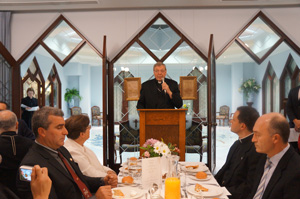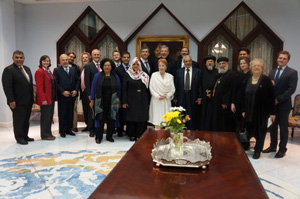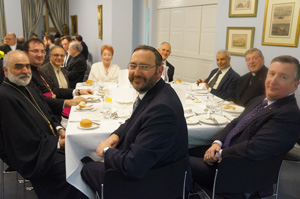Catholic Communications, Sydney Archdiocese,





7 Aug 2013

Cardinal Pell address 70 guests at last night Iftar Dinner
Last night in what has become an annual tradition the Archbishop of Sydney, Cardinal George Pell hosted an Iftar Dinner at Cathedral House for more than 70 guests representing 15 different denominations and faiths.
Iftar refers to the evening meal when Muslims break their fast during the holy Islamic month of Ramadan and is a religious observance often shared within a community with families, friends and neighbours gathering around the table to break their fast together.
Hosted by His Eminence and held for the first time last year, the Iftar Dinner at the Cathedral is a positive sign not only of Sydney's vibrant multi-culturalism but also of a city that celebrates and respects other faith traditions.
In a world where intolerance of other faiths, beliefs and cultures is a frequent occurrence, the Cardinal's annual dinner is a way of reaching out to those of different denominations and faith traditions in mutual respect, friendship and hope for the future.
Grand Mufti and spiritual leader of Australia's Muslims, Dr Ibrahim Abu Mohammed was one of the many dignitaries and important religious leaders who were guests. Others included leaders of Islam, Judaism, Buddhism, Hinduism, Judaism together with leaders from Australia's Eastern Rite churches as well as representatives from a range of Christian denominations such as the Uniting Church, the Lutheran Church and the World Council of Churches.

The Cardinal with many of Sydney and Australia's religious leaders prior to last night's Iftar dinner
Also at the dinner were members of the Aboriginal Catholic Ministry, the Prelature of Opus Dei, the Sisters of St Joseph, the Columban Mission Institute, Sydney's Catholic Education Office, St John's College and a number of city parishes.
Sr Giovanni Farquer rsj, Executive Director of the Sydney Archdiocese's Commission for Ecumenical and Interfaith Relations who organised the dinner also welcomed Bishop Terrence Brady, Auxiliary Bishop for the Archdiocese, Supreme Court Justice His Honour Francois Kunc and Stepan Kerkyasharian, Chair of the NSW Community Relations Commission.
The evening began with a welcome to Country by Graeme Mundine, Executive Officer of Sydney's Catholic Aborginal Ministry and was followed by a reading from the Holy Qu'an and then Grace after which the meal was served.
In addressing the gathering Justice Kunc spoke about the importance of the rule of law in Australia.
"One of the basic features of the rule of law is equality before the law," he said.

Cardinal Pell (second right) and Sr Giovanni Farquer (far end of table) at last night's Iftar dinner
"That is the case for people of faith and no faith. However, the good order of our society both encourages and is enhanced by the example that our faith communities give when they demonstrate tolerance and mutual respect between themselves. Furthermore, those with views informed by religious belief are as entitled as anyone else to their place in the public square. The exercise of responsible citizenship by people living lives of integrity within their faith traditions is not only entitled to the respect of the broader society. It should also be recognised as one of the many ways that a good society is created and sustained." The judge concluded in the words of Pope Francis' message for the end of Ramadan by encouraging all present to be "true promoters of respect and friendship".
At the end of the main course, His Eminence Cardinal Pell addressed the gathering and began with a reading of Pope Francis's recent personal message to Muslims throughout the world who were celebrating the end of Ramadan this week.
"I am aware that family and social dimensions enjoy a particular prominence for Muslims during this period and it is worth noting that there are certain parallels in each of these areas with the Christian faith and practice," Pope Francis said and went on to underline the importance of education in the way Muslims and Christians understand each other and build on the foundation of mutual respect.
More than 14 different denominations and faith traditions were represented at the Archdiocese of Sydney's annual Iftar dinner
"Respect means an attitude of kindness towards people for whom we have consideration and esteem. Mutual means that his is not a one-way process but something shared by both sides," the Holy Father said and went on to explain that what Christians, Muslims and those of all faiths are called on to respect in each person is first of all his life, his physical integrity, his dignity and the rights arriving from that dignity, his reputation, his property, his ethnic and cultural identity, his ideas, and his political choices.
"We are therefore called to think, speak and write respectfully of the other, not only in his presence but always and everywhere avoiding unfair criticism or defamation. Families, schools religious teaching and all forms of media have a role to play in achieving this goal."
With regard to Muslim and Christian youth the Holy Father urged all of us to bring up our young people to think and speak respectfully of other religions and their followers and to avoid ridiculing or denigrating their convictions and practices.
Pope Francis also spoke about not only respecting other religions but urged respect for the religion's teachings, symbols and values.
Grand Mufti and spiritual leader to Australia's Muslims Dr Ibrhim Abu Mohammed responded to the Cardinal's address
"Particular respect is due to religious leaders and to places of worship. How painful are attacks on one of these!" the Holy Father said.
In past years the message to Muslims from the Vatican at the end of Ramadan has come from the Pontifical Council for Inter-religous Dialogue.
But as His Eminence told those at the dinner as this was the first year of the Holy Father's pontificate, Pope Francis had decided to sign the traditional message himself and send it as "an expression of esteem and friendship for all Muslims, especially those who are religious leaders."
The response to the address by Cardinal Pell was given by Mufti Dr Ibrahim Abu Mohammed who also spoke of the importance of education in breaking down barriers and creating understanding and fostering friendship and respect between those of all faiths.
SHARED FROM ARCHDIOCESE OF SYDNEY
Comments